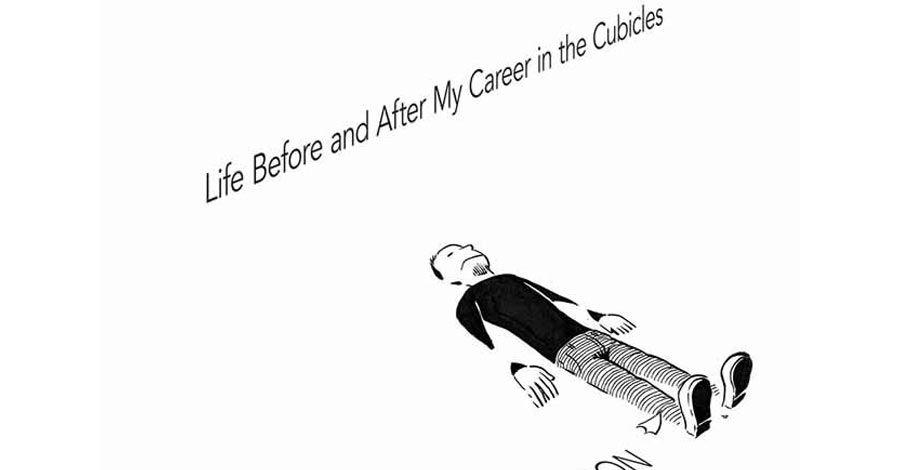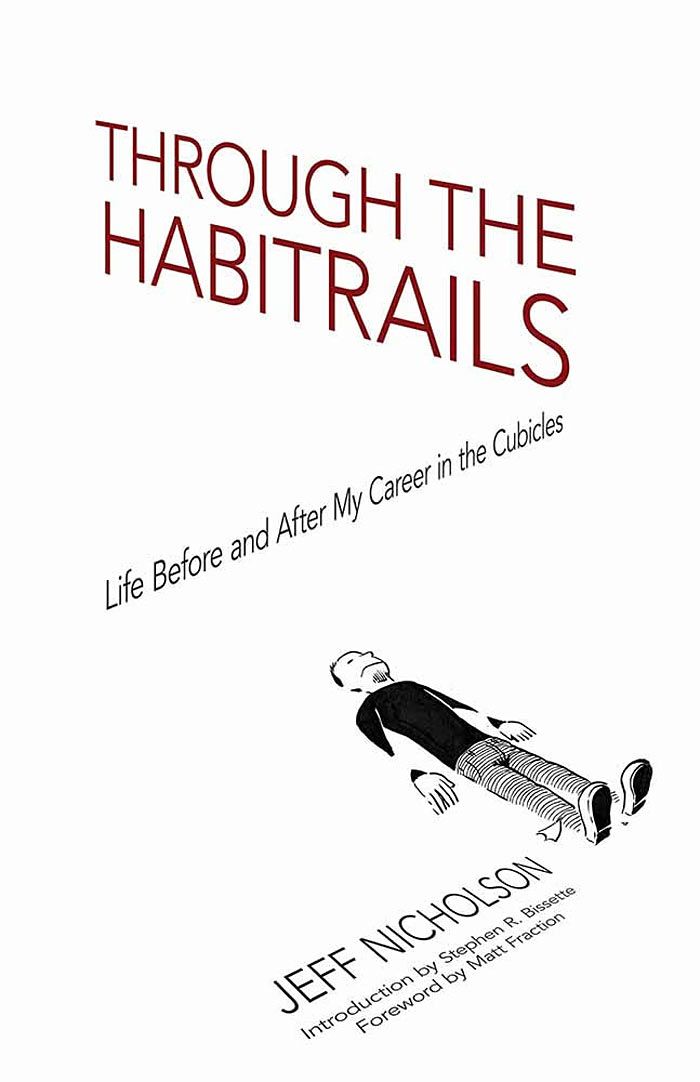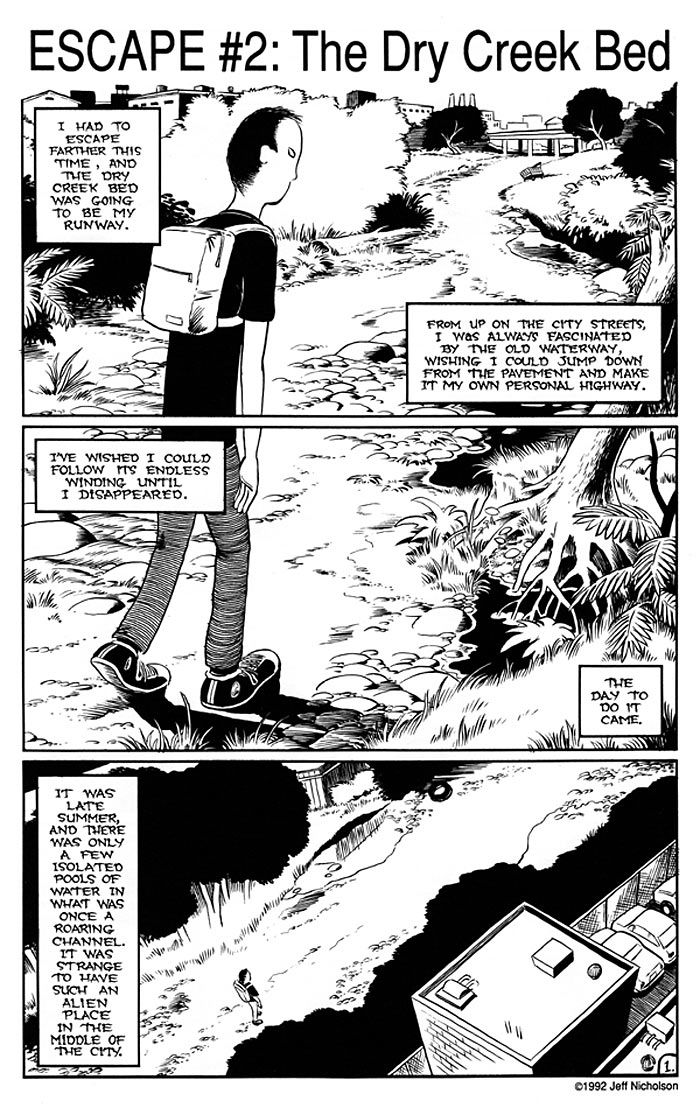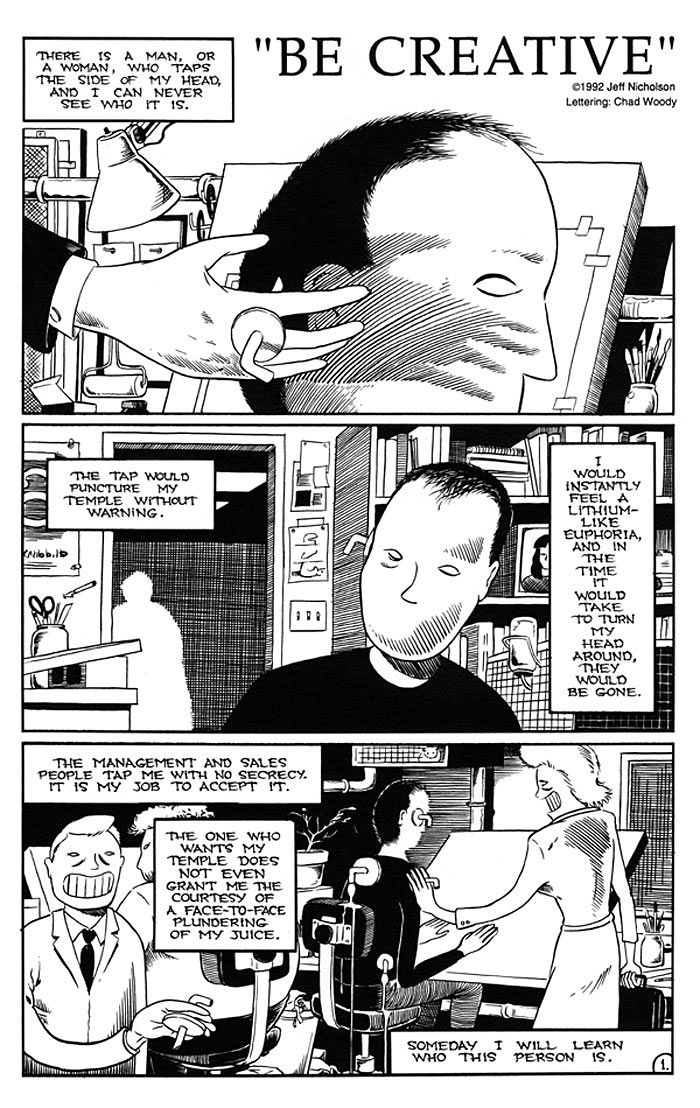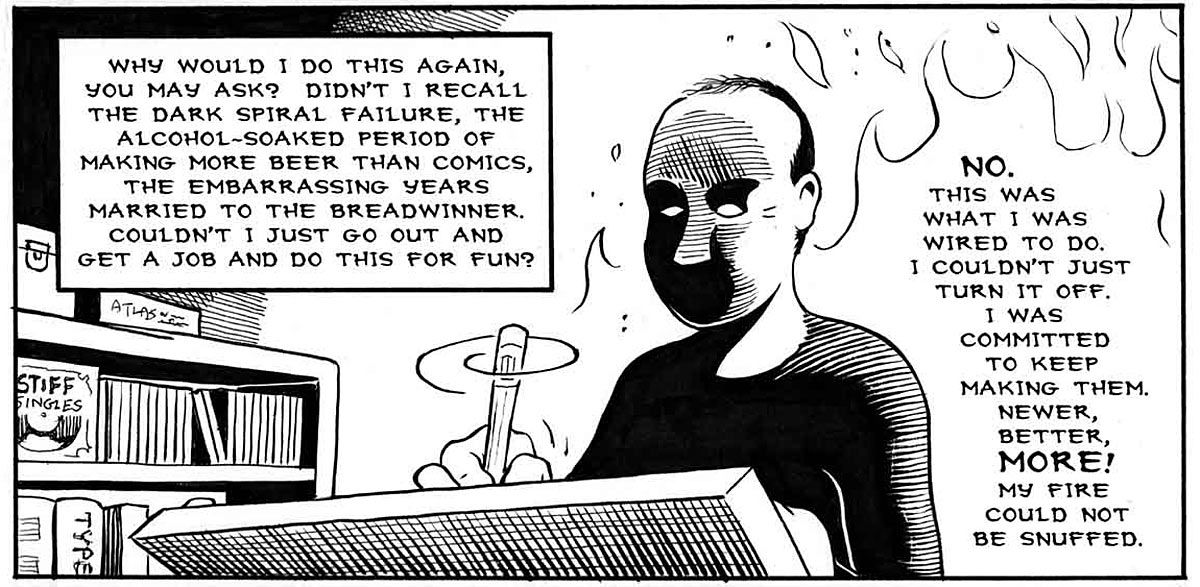Jeff Nicholson became a major voice in independent comics when "Ultra Klutz" began in the 1980s. Between "Father and Son" at Kitchen Sink Press and "Colonia," which he originally self-published, the cartoonist did nothing but solidify his reputation. In addition to his own projects, he contributed to anthologies including "Taboo" and "Negative Burn" and had a story in Vertigo's "The Dreaming." Following the final issue of "Colonia" in 2004, Nicholson retired from comics.
Despite his lengthy resume, "Through the Habitrails" remains arguably his most acclaimed work. The story of a stifling, surreal workplace touched a nerve when it was first published in 1989, and its biting humor remain just just as raw more than 25 years later. Dover's new collected edition contains a new epilogue, the first comic from Nicholson since his retirement.
CBR News spoke with Nicholson at length about what originally inspired the project, why it originally ended so abruptly, and his decision to retire -- and un-retire for this new edition -- from the medium.
CBR News: It's been a while, but do you remember the origin of "Through the Habitrails?"
Jeff Nicholson: I had been doing comics for a living with "Ultra Klutz" for a few years and I had to put it on hiatus and go back to work. That led me to work at a newspaper that I had actually done an internship at in college. It was a newspaper and we did freelance graphic design. What you see in "Habitrails" is -- if you can imagine it -- a mutated version of this newspaper. I only worked there for a little over a year but that's what bore the whole series.
It's ironic that "Ultra Klutz" went on hiatus -- which was a very sad thing -- and if that didn't happen, I wouldn't have worked at this paper which would not have led to "Habitrails," which got me a lot farther in comics. It's one of those funny twists of fate. If I didn't go on hiatus, who knows what different reality I would be in now.
"Ultra Klutz" was a part of the 1980s black-and-white indie comics boom, was it not?
That's right. I was one of the lucky ones. I had been doing comics since 1981 and when I launched a new version of "Ultra Klutz" in '86 was really when that was taking off. It was just perfect timing.
The character designs in "Through the Habitrails" have always stayed with me. The large heads, no mouths. It's very distinctive. Where did that aesthetic come from?
The designs were inspired by this illustration Charles Burns did for the Sub Pop record label -- Nirvana's first album was on that label. That Charles Burns style with a lot of crosshatching and had a hunched over character with a big head. He didn't have the no mouth thing, so I'm not sure where that came from. Afterward people would say it's a metaphor for having no voice and all that, but I wasn't really consciously thinking anything like that. I think it just made them all look a little more simple. I think I was trying to have less expression on them.
I read "Habitrails" previously, but I didn't know all the background until I read Steve Bissette's introduction in this edition. How did the book originally come together?
Like I said it was after "Ultra Klutz" went on hiatus. Part of this new series was based on my experience in this newspaper and it just quickly took on a life of its own. I think I had a rough idea of what some of the chapters were going to be right away. I had this weird idea of each chapter being published by a different independent publisher, which I thought would have been weird and spooky. I sent copies to Comico, Eclipse, and whoever was around at the time. Dave Sim had sent copies to Steve Bissette, which is how Steve became aware of it. I don't think I was even aware of "Taboo" at the time. Comico had responded with interest and Dave Sim got excited about that and said, "I'll do a preview in Cerebus, let's get a bidding war started between some of these publishers."
That's when Steve called me and pretty much secured it for "Taboo." Comico went bankrupt shortly after that anyway. The chapters started coming out in "Taboo" in 1990 and were coming out pretty briskly for two or three issues. Then he was having financial troubles and so there was a gap and then he started getting money from Tundra, which he talks about in that introduction. The really wonderful thing I always like to thank Steve for is he paid me a page rate for all of the pages-including the ones that were never published because ultimately "Taboo" did go under. That that was extremely generous and he returned all the artwork and we've always remained friends. It was an excellent experience. A few more years had gone on. I tried another series which really flopped miserably. I thought I'd better get "Habitrails" in print in a collected volume and do it myself. That came out in 1996 and it did well. It made a modest profit, but it was at the time when there was a lot of troubles in the comics industry and distributors were merging or folding and so it wasn't a big smash.
Did you work on "The Dreaming" at Vertigo during that time, or was that later?
What was next would have been "Father and Son." I had these cycles of going back and forth between self-publishing and having a publisher. I went back to Kitchen Sink with "Father and Son," which is another great experience. Denis Kitchen is just a stand up guy. It did pretty well, always just barely enough to make a living which keeps you going. But then you're starting to think, I'm not making as much as a plumber and all that good stuff. That was Kitchen Sink.
Then there was "The Dreaming" for Vertigo. I did some work for Paradox Press. I was doing comics coloring for DC, ghosting for someone. I was doing comics for a living between all these different things. That's when I became bold enough to do a second edition of "Habitrails" with the goal of trying to crack the book market. I didn't focus as much on comics and I really learned about the book trade and went after that pretty aggressively. I had one book distributor. I was selling to Tower Records -- for anybody who remembers the Tower Records chain -- they were going pretty strong at that time around 1996-7 and bought a lot of copies. But again, it was just not enough to make a living. By then I'm getting into my thirties and it gets harder and harder to live like a college student. I think that's when I finally transitioned to trying to do comics on the side of my day job. '97-'98 was when I pretty much knew this was not going to be a full-time gig. That's when I did "Colonia," which was all done while working full-time. The second edition of "Habitrails" didn't sell a ton at first but it ultimately completely sold out the second edition.
"The Dreaming" was one of the first times I saw your work, and in a number of ways it feels like a companion piece to "Habitrails."
Oh definitely. It's a funny story there. They first approached me because of "Habitrails" and that went on for so long. I think it was a year and a half or two between their first contact and when the book was printed. I felt like, don't they make movies faster than that? [Laughs] I'm glad I did it but it was a learning experience. First they said I'm going to be in the first issue of "The Dreaming" and do a story arc and it was going to have Cain and Abel. Just writing a draft of that was a kick because I read those old comics with them in the '70s. The original story that I pitched eventually ended up becoming this thing called "No Regrets" that I did later. They ended up rejecting it and said why don't we have you do one issue with Mervyn Pumpkinhead. Then it went on and on. I think it ended up being issue #15. There's a little bit of editorializing but not too much. I love the colors. I love the lettering. I loved the experience of being published by DC. When I grew up, in the early to mid-'70s, that was my favorite company so all and all very cool.
In his introduction, Bissette called it an unofficial sequel and that feeling of escape drives both books.
Definitely. I don't think it was conscious, but that book was still so current for me and even though I wasn't working at a newspaper I was still struggling to make a living. It's a similar motif here. Boxed in by things that are corporate and you want to be doing something different. Yeah, the guy in "The Dreaming" is definitely a kindred spirit of the "Habitrails" guy.
In the original end of "Habitrails," you comment in the text that it feels odd and abrupt. So why was that the ending?
It was mostly based on real life experience. It was something happening at the time that was optimistic. I'm trying to remember the timeline but it was based on a real life experience that would have happened before I finished the book. I think that influenced the ending.
For this new edition, you wrote and drew a ten-page epilogue. I liked the comic, and I'm going to ask you a question I hate, but I'll ask it anyway -- how autobiographical is it?
Here's a cheap answer, parts of it are and parts of it aren't. [Laughs] How much? I would say, maybe twenty percent? There are obviously metaphors in there like the rest of the book. The dog is clearly metaphor.
I suppose that it's probably as autobiographical as the rest of the book, but it's less absurd so people read it differently.
Right. I don't know if that was intentional but I like the way the epilogue is obviously about aging. For this character the world calms down so the epilogue is less extreme. There are some things that are obviously surreal and couldn't exist on this world, like a dog just walking through walls and eating paper. The fact that it's a little more grounded is part of why I wanted to do it. In a way it's like a happy ending. As you said was a little too abrupt in the first, and this is a little happier but also a little slower and more reasonable and maybe makes a little more sense.
I loved the comics ghost town in the epilogue.
That is thinly autobiographical in the sense that I am a ghost town enthusiast. I go and drive through the desert and look for stuff like that. It was actually an idea I had for a comics series. It was the only series that I thought of doing after "Colonia." I have lots of dreams about having new comics series, but they're just dreams. I'll have this dream where I'll have this whole series I never did and then I wake up and it isn't real. It feels very real because I was always making new series.
The ghost town studio was the last idea I had thought of and was excited enough to write down. I ended up just making it part of this epilogue because really I never did start it. The epilogue is a blend of a sequel to "Habitrails" that I had written a synopsis for and this ghost town studio idea.
You retired from comics after "Colonia" ended. Why was that the end for you?
I was just not getting enough returns for the energy. Which is hard to really quantify. It's not just financial. Some form of success whether it's financial or fan reaction or critical acclaim. There are different degrees of success. Something could sell really well like "Ultra Klutz" #1 and make lots of money. Something could get really awesome reviews like "Habitrails." Something could have a cult status. I don't know, but there's a threshold where you need a certain amount of whichever form of success it is to make up for the fact that you're making comics on the evenings and the weekends. In the case of "Colonia" I was so determined that this thing would be get out of the box that I did three bimonthly issues. I was going to give it my all. I just worked my ass off on evenings and weekends. I totally hit the wall and didn't take it any farther.
The epilogue is the first thing you've drawn since then, is that right?
The last thing I did was I started doing thumbnails for "Colonia" beyond the published issues. I don't know if you've seen them but they're on my website. I did about twenty pages of thumbnails and scripts. I think that was before I knew the end was near and so I was still pretty enthused.
AiT/Planetlar was doing the collections of "Colonia." The nail in the coffin was that there's also the theory that maybe people are not reading the periodical because they're waiting for the collected volume and that's why sales are dropping. They were reluctant to print the second volume because they had gotten the orders in from the distributors and they were too low. I said, if you go ahead and publish the second edition you can compare the royalties on the two and take the deficit on the second one against the first one. So they went ahead and published it. That's when I knew. All this time I was thinking, maybe everybody is just waiting for the collected and then it barely sold. That's when I stopped.
How did sitting down and drawing again feel?
Wonderful. [Laughs] I couldn't believe I was doing it. Just to give you an image of how wacky it was, my drawing table was my 13th birthday present from my parents. I was always drawing on a counter top or drawing in the corner somewhere so for my birthday I got a table from my parents. That's the same table I used my entire career. I couldn't bear to throw it away so it's always been in the garage and when I realized I was really doing this epilogue I brought it back in the house and set it up. I took a picture of it and emailed it to my parents and said, "what's wrong with this picture?" My dad said, "You're drawing comics again?" [Laughs] I was surprised at how delighted I was. People have approached me about reprinting things and a lot of times it seems half baked. Even with Dover I thought, whatever, but when I realized it was credible and Drew [Ford] said, what about an epilogue? I think it was because I knew they were credible. Because they were seeking me out, which is different from me forcing the world to want more of me. If someone is coming to you and saying, we really want you to do this, that's a little bit different motivator. I distilled it down to a nice ten pages which was really all I was up for. I have a very demanding day job and I just couldn't imagine doing an entire comic, but ten pages was just right.
So maybe we'll get another ten pages of comics from you next decade?
[Laughs] It's hard to say, but it could happen. And of course when I retire, who knows what will happen. That may be such a freeing experience I'd want to do more, but it's hard to speculate.
I'm glad you got back to enjoying making comics again.
Absolutely. It was super fun. And luckily I saved all my art supplies because they don't make a lot of particular supplies anymore. I still had a lot of Windsor Newton #2 brushes. I got lucky. There was a college store that I think mis-priced them and I bought about twenty of them because they were so cheap. Luckily I had those stashed.
Are there any other collections of your work you'd like to see in print?
I would love it if someone wanted to do a "Father and Son" collection. I did one collection that collected the Kitchen Sink issues and I didn't print much overrun. It sold out and it doesn't include the other single issue and some short stories I had done. "Ultra Klutz" has been collected, "Nicholson's Tirade" has been collected, "Colonia" was collected, so if there's one other thing I'd like to see it's a complete "Father and Son." I don't know if anybody would be up for that, but I think that would be fascinating.
"Through the Habitrails" is on sale now from Dover Books.

